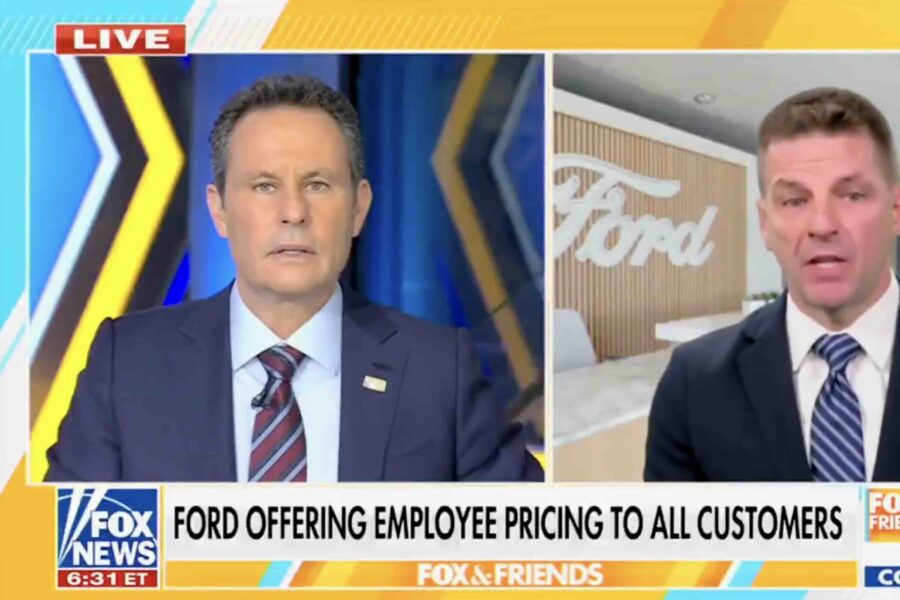Politics
NEW: Trump Tariffs Drive Major Automakers To Boost Production In U.S., Offer Discounts To Americans

Two of the world’s largest automakers announced on Thursday that they are offering America First deals on new vehicles for customers or making production changes while seeking to take advantage of President Donald Trump’s new tariffs on foreign-assembled vehicles.
For the next several months, Ford will be touting a “From America, For America” deal, which will offer new customers the chance to purchase vehicles at employee pricing, potentially knocking thousands of dollars off the going rate.
Steve Croley, the company’s chief policy officer, told “Fox & Friends” that Americans deserve a break for going out of their way to buy American-made cars.
“We’re going to offer customers the same deal that our employees get. That’s worth thousands of dollars,” he told host Brian Kilmeade.
“We’ve heard some uncertainty from our customers and we want them to be assured that Ford, the most American auto company, is going to do right by them, as are our dealers. We make the most cars here, we employ the most, we export the most, and so we here at Ford, we’re in a good position to address customers’ concern and give them a really great deal on a great vehicle,” he added.
WATCH:
Swedish car company Volvo, meanwhile, has promised to ramp up its production of vehicles at its South Carolina factory. The shift comes one day after President Donald Trump announced a “Liberation Day” rollout of 25% tariffs on all foreign-assembled vehicles around the world, with the exception of Mexico and Canada.
“We will have to increase the number of cars we build in the U.S., and surely move another model to that factory,” CEO Håkan Samuelsson said in an interview Thursday. He noted the company already builds its EX90 and Polestar 3 electric vehicles at its plant near Charleston and “will have to look closely” at what other model vehicles may be assembled stateside, as well.
Volvo’s South Carolina plant first opened in 2018 with the intent to produce new vehicles in the U.S. Months later, the company canceled plans to ship many of those vehicles to China after the country imposed tariffs on American-made cars.
Part of the learning curve for auto company CEOs will be how to reduce manufacturing costs while boosting profitability without shifting the entire burden on to customers, Samuelsson said at a recent shareholders meeting.
“My job is to regain investors’ confidence,” he explained.
The race to bring auto assembly back to the U.S. was already underway before Wednesday’s tariffs. Last month Honda announced that it would renege plans to assemble its 2025 Civic model at a Guadalajara plant, instead opting for an existing manufacturing site in Indiana.
The company’s decision followed similar ones by Hyundai, which announced a $20 billion domestic investment, as well as Stellantis’s commitment to reopening a plant in Belvidere, Illinois to produce its midsize trucks.
Automotive unions cheered President Trump’s announcement in their own statements this week.
“Mr. President, we can’t thank you enough. In six months to a year, we’re going to see the benefits, I can’t wait to see what’s happening 3-4 years down the road. Thank you, Mr. President,” one member of the United Auto Workers said at a press conference in Michigan one day before the announcement.
SUGGESTED VIDEOS FOR YOU
Sen. Kennedy SPILLS THE BEANS on Biden’s $2 billion GIFT to Stacey Abrams!
Ex-FBI agent ADMITS THE TRUTH about Biden laptop during Jordan grilling!
“CHECKMATE”; What EVERYONE missed from Trump’s tariff launch!
Amy Klobuchar MELTS DOWN during fiery debate with Ted Cruz!
BOMBSHELL: Elon proves Biden used loophole to GIVE ILLEGALS VOTES!
Help Us ERADICATE The Left Wing Media By Subscribing To Our YouTube Channel!
Subscribe for Daily Reporting on the Trump Administration & Always Receive the Truth!







